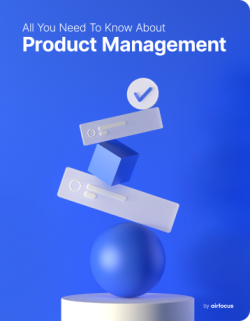Product Disruptor
What is a product disruptor?
Product Disruptor Definition
The term product disruptor, borrowed from ‘industry disruptor’, refers to an innovation that changes a product’s business model, value proposition or strategic direction.
Recent well-known product disruptors include Netflix — which shifted from being an innovative DVD-delivery provider, to a digital streaming service — and the 1998 iMac, which launched Apple onto its market-dominating trajectory.
It can be difficult to separate ‘industry disruptor’ and ‘product disruptor’, as one often leads to the other. But simply, a product disruptor is a specific product that changes the game for a business, whereas an industry disruptor creates a new market.
How do product disruptors add value?
As we’ve already mentioned, a product disruptor can alter the course of a product’s strategic path, in doing so it can also change a product’s business model and the value it provides to users or customers.
So why would you want to develop a disruptive product?
There are three key reasons:
Product disruptors help protect your business from market threats
Failure to spot, and prepare for, changes in the marketplace can be the final nail in the coffin for struggling businesses.
When technologies evolve, and new entrants appear in the market, a business needs to be aware of the threats to their unique selling proposition. We only need to look at Kodak’s story to see how overlooking the potential for disruptive product innovation can mark the beginning of the end.
But even when you’re at the top of your game, a business can’t afford to get complacent. instead, companies always need to be looking towards the future and thinking of ways to change the market with a product disruptor.
Consider Netflix who, at the time, had created and then dominated a new market with its DVD-by-mail product offering — but this was not an ownable position well into the future.
Indeed, any other business — Blockbuster included — could have picked up this business model and run with it. So, understanding this market threat, Netflix looked ahead at the disruptive products it could start to develop. And then, before anyone even had a chance to catch up with their first disruption, Netflix launched into Internet streaming, and then again into actual TV and film production.
Today, Netflix is an almost untouchable juggernaut of the film and entertainment world. And continues to invest in product disruptors, such as Netflix Originals.
Developing a product disruptor can set you apart — and ahead — of the competition
As well as market threats, every business should have a close eye on its competition.
Being the first to market with a product disruptor creates significant space between you and your next rival. This can help secure a business’s market position, retain and win new customers and increase its stock value.
For example, we can return to Apple for a successful example of this.
By creating a brand ecosystem — that is laptops, tablets, phones and now smartwatches and Apple TV+, which all sync, communicate and integrate with each other — Apple has locked in millions of loyal customers by creating its own product disruptor.
It’s actually harder for a customer to leave Apple now, as suddenly they wouldn’t have a digital calendar which works across all devices, or a memory bank of thousands of photos available whichever screen they are sat in front of.
Despite the ever-evolving iPhone often delivering divisive new features — Apple Airpods, for one — this disruptive ecosystem looks like it’ll keep creating brand advocates long into the future.
Innovation, in the form of a disruptive product, can maintain your relevancy with evolving customer needs
As product managers and developers, it’s absolutely crucial to understand the value you deliver to users.
If a customer’s behavior changes, and you’ve not got a trick up our sleeve to help support that shift, then chances are they’ll look to a competitor instead.
That’s why product disruptors can help a business maintain relevance with its user base. You needn’t discontinue products if customer behavior takes a turn, but you can develop new products and features in response.
One example of this is digital transformation — bringing previously manual or paper-based processes into the digital age, e.g. a traditional bank investing in user-centric mobile banking. Another is of classic, luxury car brands like Porsche and Aston Martin moving into the electric car space.
In both these instances, whilst the innovation doesn’t carve out a new space in the market, it ensures the business continues to add value in line with new customer wants and needs.
What are some common challenges with product disruptors?
For all the value they deliver, product disruptors do carry some risk.
Of course, as with any innovation, it might not work.
And with the vast majority of product innovations ending in failure — up to 95% according to HBR — this is a real possibility.
But even if a product disruptor does succeed on launch, there are a number of considerations to keep in mind.
For one, a significant disruption will alter a product’s value proposition.
At times, this can be a positive move, especially if the innovation opens up a new value space to play in.
For instance, when Instagram was first looking to get major investment to build its platform, founders Kevin Systrom and Mike Krieger thought they were building a social geo-location app. Only when they realized that empowering users to apply professional-grade filters to their upload was a massive value add, did Instagram really start to gain traction and unveil its product disruptor.
Other times, though, a product that changes the value proposition can be a little dangerous — if you’re an established business, with a strong base of happy customers, knocking the status quo could serve to segregate existing and new users. Loyal consumers may feel that your business has moved too far away from the value proposition they originally bought into.
When it comes down to it, the benefits of product disruptors tend to outweigh the risk.
A product manager simply needs to lead their team towards an innovation that’s worth the potential fallout.

General FAQ

Glossary categories
Experience the new way of doing product management

Experience the new way of doing product management








